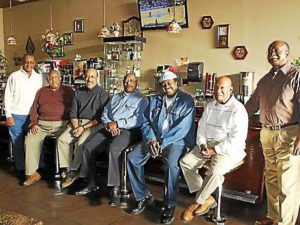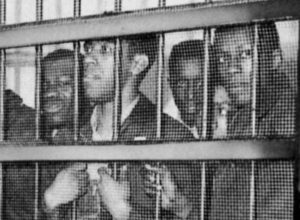“Jail, No Bail” The Story of the Friendship Nine
[AdSense-A]
Imagine waiting 54 years to have your conviction overturned for standing up for civil rights. Such is the story of ten black men who lived in South Carolina in 1961: Willie McCleod, Frank Wells, Clarence Graham, Thomas Gaither, David “Scoop” Williamson, Robert McCullough, Mack Workman, Willie Thomas “Dub” Massey, John Gaines and Charles Taylor.
On January 31, 1961, nine students from the Friendship College along with Thomas Gaither an activist whose parents were graduates of Friendship College, made the brave decision to attempt a sit-in at the McCrory’s Five and Dine in downtown Rock Hill, South Carolina. During a 2015 interview with NBC News, six of the Friendship Nine members spoke about how quickly they were forced out of their seats and dragged out of the store by police officers. The officers placed the men in the same jail cell, each facing charges of trespassing and disturbing the peace. The next day, February 1, 1961, the men were found guilty and were required to either pay a $100 fine or spend 30 days of hard labor at the York County Prison Farm. Charles Taylor decided to pay his fine because he was concerned that he might lose his football scholarship. The rest of the men, who were called the Friendship Nine, refused to pay the fine which forced the government to pay for jailing the students. They were promptly sent to the prison farm. The 1961 court docket stated the men were “sent to chain gang”.
Their decision, which became known as “Jail, no bail”, not only drew national attention, but it also helped the civil rights movement which had been struggling financially from paying the fines and bail money of many civil rights activists. For thirty days, the Friendship Nine were forced to move large sand piles, cut weeds, carry heavy cement blocks, and work on private farms. The group was released from jail two days early in order to keep the press from covering their story.
In the years after their release from the York County Prison Farm, John Gaines went on to attend law school at Howard University, and worked as a lawyer in civil rights and general law cases. Thomas Gaither, was drafted into the Army, and would later work as a professor at Slippery  Rock for nearly 30 years. Clarence Graham joined the Air Force in 1962 and served in Vietnam. He went on to work in social services for over 20 years. Sadly, Graham passed away at his home in Rock Hill, South Carolina on March 25, 2016. He was 73 years old.
Rock for nearly 30 years. Clarence Graham joined the Air Force in 1962 and served in Vietnam. He went on to work in social services for over 20 years. Sadly, Graham passed away at his home in Rock Hill, South Carolina on March 25, 2016. He was 73 years old.
Willie T. Massey was drafted into the Army and went on to work as a teacher after his time in the military. He has also been a guidance counselor in the York school district. Robert McCullough, went on to join the Air Force, and would later become an instructor at Friendship College. Sadly, McCullough died in Rock Hill, South Carolina on August 7, 2006. He was 64 years old. Mack Workman moved to New York where he would work with troubled youth. He retired in 2006. James Wells joined the Air Force and later earned a law degree from the school of law at the University of Illinois. He practiced law in Rock Hill until retirement. Sadly, Wells passed away at his home in Rock Hill, South Carolina on July 8, 2018. He was 77 years old. David Williamson, JR. moved to New Jersey, but would later move back to South Carolina where he would mentor young men and talk to schools about the Friendship Nine. He also works part-time as a substitute teacher in South Carolina. Willie McCleod went on to join the Army. He would later run his own business, and spend time speaking to school groups about the Friendship Nine.
In 2014, children’s author Kimberly Johnson released a book titled, “No Fear For Freedom”, about the Friendship Nine. It was Ms. Johnson who would urge the 16th Circuit Solicitor Kevin Brackett to erase the convictions of the men. She met with Solicitor Kevin Brackett, who stated that he had been approached by people several times about the possibility of throwing out the convictions of the Friendship Nine, but he was not sure how to do it. “The question has been how to go about doing it. Expunging the record or a pardon didn’t strike me as appropriate because they (the Friendship Nine) didn’t do anything wrong”, he told Kimberly Johnson. But after their meeting, Circuit Solicitor Brackett decided upon a way to do it while honoring the brave civil rights activists.
On January 28, 2015, 54 years after the initial arrest and sentencing of the Friendship Nine, Circuit Court Judge John Hayes III, the nephew of the original trial judge, would hear the motion to clear the records of men on the basis that they were unjustly convicted. Retired South Carolina Chief Justice Ernest Finney, who became the first black Chief Justice in South Carolina, was a lawyer when he originally represented the Friendship Nine in 1961. He would represent them again during the court hearing. Chief Justice Finney made this statement: “Let the decision of the court today show the resolve of South Carolina to work together, to progress together, and to ensure the promise set forth under our constitution that all men are equal under the law.” Sadly, Chief Justice Ernest Finney passed away on December 3, 2017 at the age of 86, from complications of Alzheimer’s Disease.
While the surviving members of the Friendship Nine felt vindicated, Clarence Graham expressed to the LA Times that he wished his name could have been cleared back in 1968 when he returned from the Vietnam War and had trouble finding a job.
The Friendship Nine has been honored in several ways. In 2007 a plaque was placed at the site of the McCrory’s store in their honor. There is also a plaque at the York One Academy where Willie T. “Dub” Massey once taught. The names of the men, engraved in gold plates, were also placed on the original stools at the original lunch counter. However, the Five & Dine restaurant which was originally McCrory’s store in 1961, closed in 2018. There is hope that a new restaurant might take over the spot and preserve the original lunch counter. In July of 2020, a mural was painted by Rock Hill residents in downtown Rock Hill that reads, “No Room For Racism”. The last nine letters of the mural feature the faces of the Friendship Nine.
[si-contact-form form=’2′]


